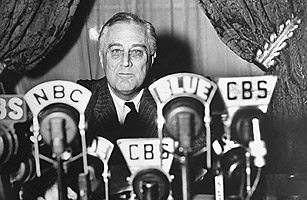
Pres. Franklin D. Roosevelt making a Fireside Chat speech on radio during WWII.
(2 of 2)
The populist factions, meanwhile, failed to cohere. Long was assassinated in 1935. His follower Gerald L.K. Smith — a frothing anti-Semite with a narrower base than the charismatic "Kingfish"-joined with Coughlin and Townsend to challenge FDR in 1936 with th "Union Party," but their union rested mainly on a common dislike of Roosevelt. With an undistinguished North Dakota congressman heading the ticket, they went nowhere. Many leading dissidents, such as Upton Sinclair, endorsed FDR. He had, after all, stolen their thunder.
The current surge in populism resembles that of the 1930s in many ways: its indiscriminate anger, its unseriousness about policy, even its toleration, in some quarters, of old taboos like anti-Semitism. And compared to other recent expressions of anti-elite sentiment — Ross Perot's balanced-budget monomania in 1992 or Howard Dean's antiwar grandstanding in 2003 — today's discontent is both more radical and more dangerous. The right's "tea parties" have seethed with a bare-fanged anger that startled many leading Republicans. On the left, a younger generation has shown a receptivity to once-fringe ideas; according to a Rasmussen poll, the under-30 crowd is split on whether it prefers capitalism or socialism.
As in the 1930s, these impulses need to be contained, at least when they take the form of conspiracy theories or calls to blow up the system. But if untamed sentiment poses an inherent danger to democracy, wise leaders like FDR have always understood the need for populism in measured spoonfuls. Without populism, conservatism hardens into plutocracy, and liberalism calcifies into soulless technocracy.
Barack Obama — who as president has shown an uncanny instinct for playing it safe — has declined to imbue his policies with any populist marrow. There have been gestures: a gentle credit card-reform bill, a cap of sorts on pay for executives at companies taking federal largesse. But the president has neither promoted nor signed onto anything radical. Even the newly introduced financial regulatory reforms, billed as "a transformation on a scale not seen since the reforms that followed the Great Depression," amounts to a tightening of supervision, not a fundamental fix.
It's possible that just as Americans in the 1930s ultimately channeled their populist energies into FDR's reform efforts, so Obama is successfully marshalling the public's diffuse, intermittent anger at the system he now leads. He surely appreciates, too, that even many of his noisiest critics are still hope somehow to recapture the good old 1990s, with a bull market and expanding opportunities — not to enter a brave new uncertain economic world. Most of us aren't keen to plunge into socialism, or, for that matter, communism, Huey Longism, Coughlinism, or Townsendism.
All the same, Obama must be careful. In contrast to FDR, economic issues have never been dear to his heart. He centered his campaign on an upper middle-class vision of racial harmony, political reform, and benign American leadership in the world; he embraced kitchen-table issues only when he had to, and then in vague terms. He seems more at home extolling Sonia Sotomayor's life story than trashing economic royalists.
If Obama wanted to follow FDR's lead, he could ram through Congress a truly bracing economic measure — a Civilian Conservation Corps for the cities, or a law capping every executive's salary at ten or twenty times what his company's lowest wage-earner makes. But even if the president recoils from such strong medicine, he would still do well to find his inner populist. Indeed, too much resistance to the populist idiom could quickly resurrect the stereotypes that nearly doomed Obama's presidential candidacy a year ago — the arugula-eating elitist contemptuous of working-class concerns — only with more potent economic teeth. After all, Franklin Roosevelt tamed populism by appropriating its most constructive aspects even as he defended — as thankless a task as it can be during turbulent times — the system itself.
David Greenberg, a professor of history at Rutgers University, is the author of Nixon's Shadow: The History of an Image and other works of 20th-century American politics.